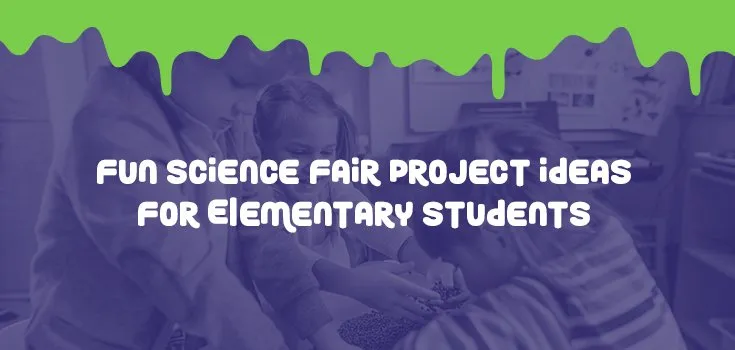The science fair is a meeting of the minds that can nurture and spark your child’s curiosity. When children learn from other students and present their own research, they better understand how the world works. As their parent or teacher, you can guide your elementary student toward an age-appropriate and exciting experiment with our fun science fair project ideas!
Amaze your audience and encourage your child to learn something new with the wonderful world of science experiments. If you need a little inspiration, check out our science fair projects for kids in elementary school.
Oobleck
Oobleck is a sensory, science and reading activity all in one! Maybe you remember Dr. Seuss’s “Bartholomew and the Oobleck” from your childhood, the story of a child saving his town from a mysterious green substance. With this experiment, your child can recreate oobleck and learn about non-Newtonian fluids. The best part — all you need is cornstarch, water and green food coloring.
Combine 1 1/2 cups cornstarch with 1 cup of water and a few drops of food coloring. Play around with the measurements until you have a gooey substance that is neither liquid nor solid! When you squeeze oobleck in your hands, it hardens, and when you release it, the oobleck becomes a molasses-like liquid. Use this fun and messy activity to discuss the differences between solids and liquids.
Grow Beans From Scratch
If your child has a green thumb, they may love this cool science fair project idea. With a glass jar, paper towel and a few kidney beans, you can grow your own bean seeds. Soak your beans in water overnight, then place them in a jar with a damp paper towel in the center. Pro tip — place your beans on the outside of the paper towel so your child can observe and keep a journal of their growth.
In about 10 days, you’ll have a bean sprout that you can plant at home! Use your child’s observations of the seed as their science fair presentation, and enjoy homegrown kidney beans in your garden.
Chromatography Coffee Filters
This chromatography project gets oohs and aahs every time. First, have your child color a circle around the bottom of a coffee filter with washable markers. Fill a small bowl with water, then place the filter’s base in the bowl. Watch as the water and marker ink travel upwards on your filter to create a beautiful design.
This experiment shows capillary action, the process of water moving through porous materials. Encourage your child to use different color markers to see how each ink blend travels. Some colors will be more impressive due to a process called chromatography.
The Leakproof Plastic Bag
The leakproof plastic bag experiment is sure to wow your audience at the science fair. All you need is a plastic bag filled with water. Make sure it’s tightly zipped! Take your sharpest pencils, and have your child quickly pierce each pencil through both sides of the bag. The trick with this project is speed, so your bag doesn’t start leaking before the pencil gets to the other side.
If done correctly, your child will notice no water escapes from the pierced bag. You can insert as many pencils as you like, and the bag will stay intact because of its polymer structure. The molecules in the plastic hug each pencil and keep the bag sealed shut.
How to Create a One-of-a-Kind Science Fair Project
Asking questions about your surroundings is the best way to create new science fair ideas. Science is everywhere, and the science fair is an opportunity to investigate everyday processes. Whether you’re making butter from scratch or asking yourself why salt melts ice, your child will have fun at the science fair when they learn more about the world around them!
Encourage Hands-On Learning With Science Explorers
Is the science fair your child’s favorite day of the year? At Science Explorers, we nurture your kid’s love for hands-on learning with immersive educational experiences. Sign your child up for our after-school STEM clubs or summer camps so they can learn something new every day! Contact us online or call 1-877-870-9517 to learn more.


